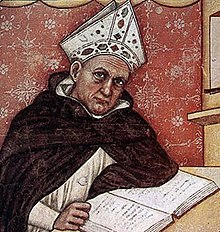Albertus Magnus
Jump to navigation
Jump to search

Albertus Magnus (before 1200 – 15 November 1280) was a German philosopher, theologian and Dominican friar who achieved fame for his comprehensive knowledge and advocacy for the peaceful coexistence of science and religion. He was the first medieval scholar to apply Aristotle's philosophy to Christian thought at the time.
Quotes[edit]
- If the excrement of an elephant should be smeared on skin in which lice appear and left until it dries upon the skin, the lice will not remain on it but will depart immediately. If the fat of an elephant is smeared with it, it is said to cure the pain of one who suffers a headache; it is even said that if an ounce of elephant bone is drunk with ten ounces of wild mountain mint from something which a leper first touched, it does the most for a headache.
- Twenty-Six Books on Animals [De animalibus libri XXVI]; cited in: Plinio Prioreschi (1996) A History of Medicine: Medieval Medicine. p. 94.
- The metals are all essentially identical; they differ only in form. Now, the form brings out accidental causes, which the experimenter must try to discover and remove, as far as possible. Accidental causes impede the regular union of sulphur and mercury; for every metal is a combination of sulphur and mercury. A diseased womb may give birth to a weakly, leprous child, although the seed was good; the same is true of the metals which are generated in the bowels of the earth, which is a womb for them; any cause whatever, or local trouble, may produce an imperfect metal. When pure sulphur comes in contact with pure mercury, after more or less time, and by the permanent action of nature, gold is produced.
- As quoted by Francis Preston Venable, A Short History of Chemistry (1894) p. 28.
- This dumb ox will fill the world with his bellowing.
- Attributed to Albertus Magnus in: Anne Jackson Fremantle (1962) The Great Ages of Western Philosophy : The Age of Belief : The Medieval Philosophers
- Albertus Magnus, in response to other of his students calling Thomas Aquinas a "dumb ox" because of his quietude.
- Natural science does not consist in ratifying what others have said, but in seeking the causes of phenomena.
- Attributed to Albertus Magnus in: Albertus Magnus; cited in: Morris Bishop (1968) The Middle Ages. p. 252.
- Do there exist many worlds, or is there but a single world? This is one of the most noble and exalted questions in the study of Nature.
- Attributed to Albertus Magnus in: R.C. Bless (1996) Discovering the cosmos. p. 686.
Quotes about Albertus Magnus[edit]
- Of Albertus Magnus, the Doctor Universalis of the Dominicans, Roger Bacon writes that what is useful in his works might be summed up in a treatise twenty times as short as they are.
- Francis Seymour Stevenson, Robert Grosseteste: Bishop of Lincoln (1899) citing Bacon's Opus Tertium, p. 30 & Opus Minus, p. 327.
- In speaking of Thomas Aquinas, who, it is true, had not attained at the time when Roger Bacon wrote to the commanding position of authority which was afterwards accorded to him in the schools, he couples him with Albertus Magnus, and says that they both became teachers before they had been adequately taught, and lectured on a philosophy and a theology which they had imperfectly learned.
- Francis Seymour Stevenson, Robert Grosseteste: Bishop of Lincoln (1899) p. 50.
External links[edit]
- "Albertus Magnus, Saint" by William A. Wallace (1970) in Gillispie, Charles. Dictionary of Scientific Biography 1. New York: Scribner & American Council of Learned Societies. pp. 99–103.
| This article about a philosopher is a stub. You can help Wikiquote by expanding it. |
